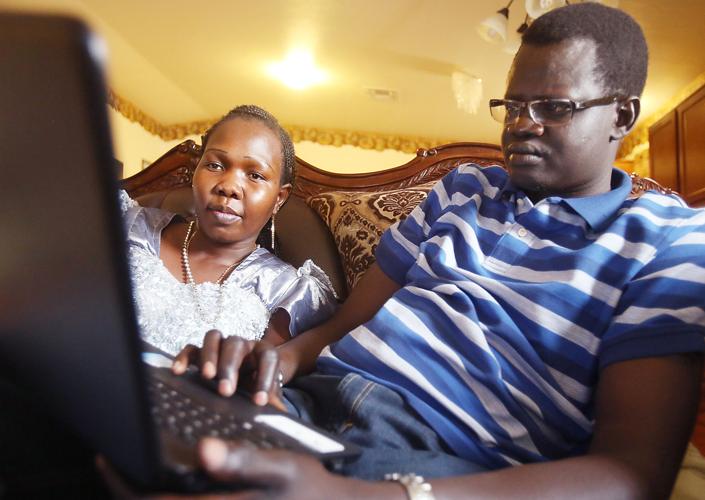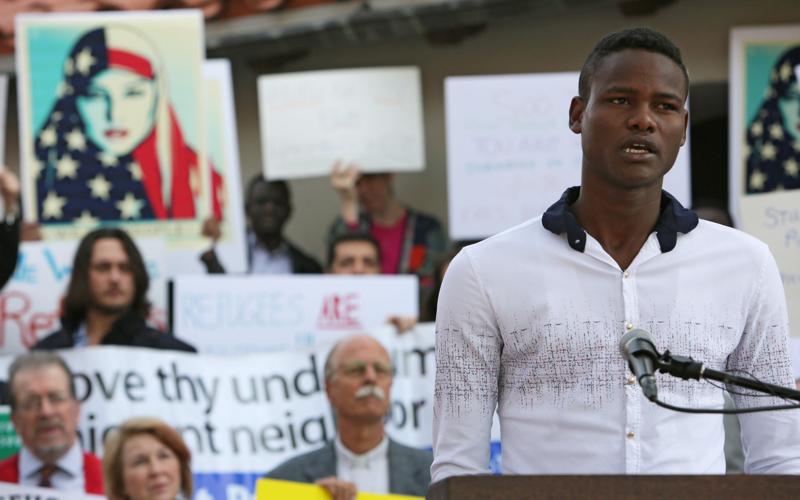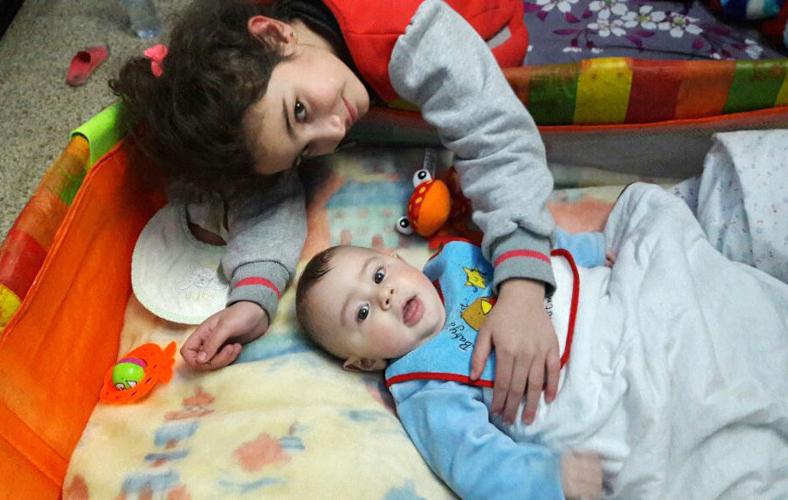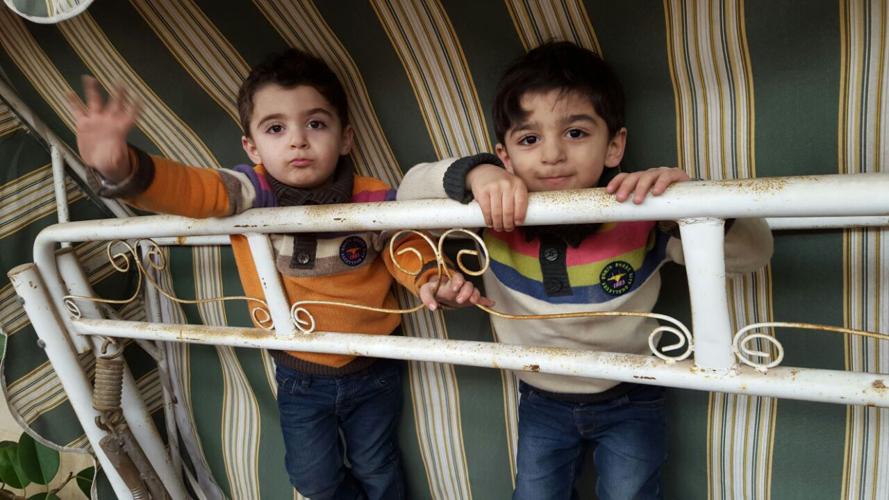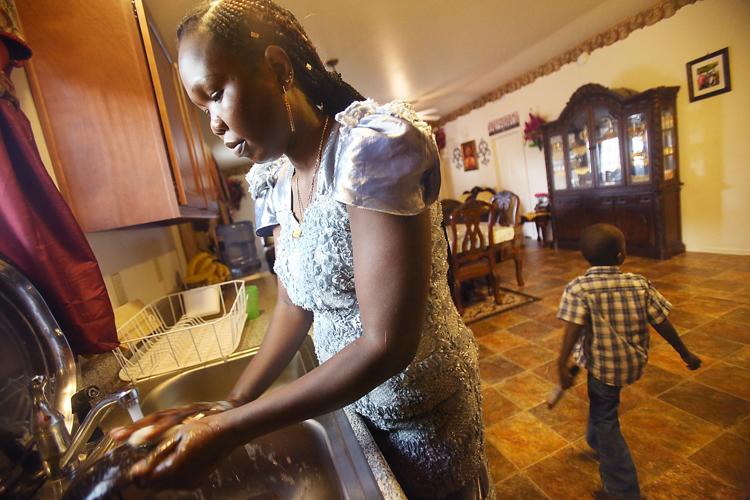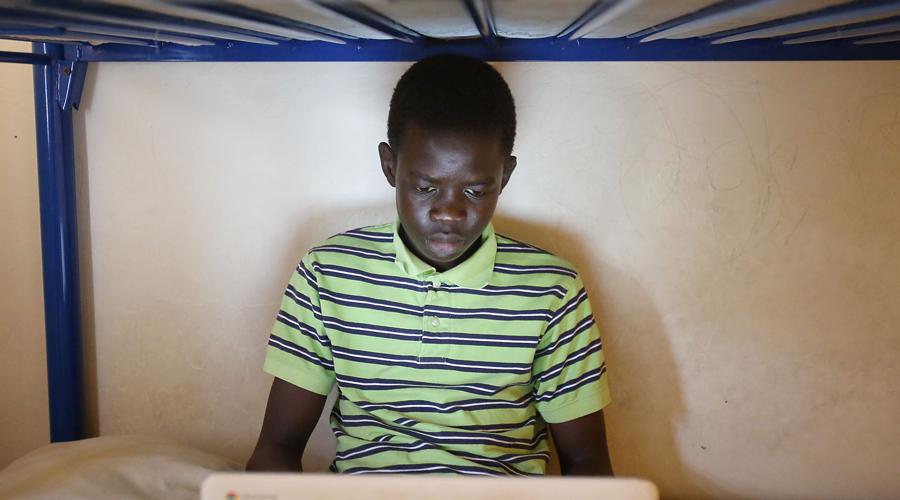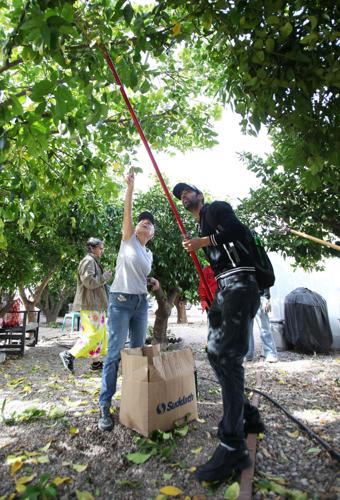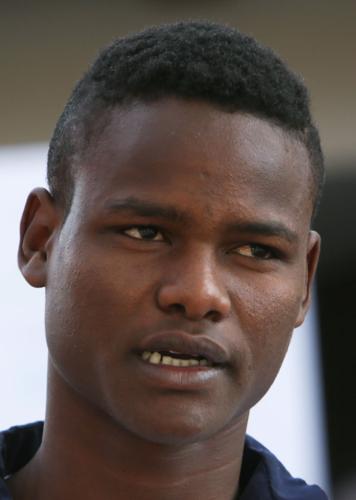Local resettlement agencies are canceling housing plans for incoming refugees whose futures are now uncertain.
International students at the University of Arizona are abandoning trips to see relatives abroad, fearing they won’t be able to return.
A 22-year-old Sudanese refugee, Osam Yahya, who arrived in Tucson alone in December, is absorbing the news that his big brother won’t join him this week, and will instead remain in a Kenyan refugee camp.
Tucsonans of all backgrounds are feeling the ripple effects of President Trump’s far-reaching executive order temporarily barring travel from seven Muslim-majority countries and suspending entry of all refugees.
On Friday, a federal judge in Seattle temporarily blocked Trump’s travel ban, a move the Justice Department appealed Saturday night.
On Saturday, U.S. borders were again open to visa holders from the seven banned countries, though it’s unclear how long that will remain the case.
Some Tucson residents with relatives stuck in dangerous countries say they are trying to keep despair at bay.
“I wonder how we work sometimes, how we function,” said Rana Sammani, whose Syrian-born husband’s siblings, a niece and three nephews are trapped in the ravaged city of Aleppo. Before Trump’s indefinite ban on Syrian refugees entering the U.S., they had hoped to soon get approval to come to Tucson as refugees.
“It’s by the grace of God that they’re still alive,” Sammani said. “This process — every day counts. Every day we’re not able to get them here may be the last day they’ll be alive.”
The travel ban has spurred support for refugees, too. The Iskashitaa Refugee Network has seen a surge in volunteer applications since last week. Members of Islamic groups say they are experiencing an outpouring of support from Tucsonans. But some are nevertheless boosting security in the wake of the Jan. 29 mass shooting at a Quebec City mosque, allegedly carried out by a far-right Quebec native.
CONFUSION AND ANXIETY
Local immigration lawyers are scrambling to nail down the exact implications of the travel ban, which caused widespread confusion and protest when it was signed and implemented late in the day on Jan. 27.
“I’ve never seen an order by the president that was so disruptive and caused so much confusion and anxiety,” said Mo Goldman, a Tucson immigration attorney.
The order is also painful for former refugees already here in Tucson. Some, like 21-year-old Suleiman Shire of Somalia, had been expecting to finally reunite with family members whose flights were canceled after the travel ban took effect.
“It’s making me afraid again,” said Shire, whose four siblings were supposed to arrive in Tucson on Feb. 7.
Sudanese refugee John Anyieth, 36, said the order goes against everything he knows and loves about the United States.
“I think this being done by Trump will cause a lot of enmity toward the U.S. people and the U.S. government,” he said. Anyieth fled war in Sudan at age 13, and lived for nearly a decade in a refugee camp. In 2003 he began the process of applying for refugee status, and it took nine more years before he, his wife and children were approved to move to Tucson.
“When I came here, I pledged to be part of this community, the U.S. land,” he said. “But now it’s like I’m being told, ‘You are not part of this group.’ I’m so worried about my future and the future of my children.”
In a forceful condemnation, Sen. John McCain, R-Ariz., said the ban undermines national security by feeding into terrorists’ recruitment narrative.
CLARIFICATIONS FROM
the WHITE HOUSE
The executive order halts the U.S. refugee program for four months, and indefinitely bars refugees from Syria. The order also bans immigrants and nonimmigrants — like foreign-born students, workers and tourists — from Iran, Iraq, Libya, Somalia, Sudan, Syria and Yemen for 90 days.
The Trump administration clarified on Wednesday that green-card holders are exempt from the ban, which the order states is intended to give federal officials time to review and bolster vetting procedures to ensure terrorists and criminals don’t infiltrate the U.S.
“This order was an appropriate step,” said Jessica Vaughan of the conservative Center for Immigration Studies in Washington, D.C. “It’s clear that our vetting system and our review process is inadequate.”
Vaughan cited a Senate subcommittee’s finding that 380 out of 580 people convicted in the U.S. of terrorist-related offenses since 9/11 were foreign-born. But a Cato Institute researcher said that statistic is misleading, noting only 40 of those convicted were plotting an attack on U.S. soil, and many of the other convictions weren’t actually on terrorism charges.
Rep. Martha McSally, R-Ariz., said in a statement the basic goals of the ban are worthwhile, even if the executive order was flawed.
McSally said she learned of “very real and dangerous gaps in our vetting processes” while serving on a Congressional task force on combating ISIS. “Our own intelligence officials have expressed vulnerabilities with these processes, which is why taking a comprehensive look at them is prudent.”
Trump recently emphasized the order is not a “Muslim ban,” a term Trump used often during his campaign and which the American Civil Liberties Union said would amount to unconstitutional discrimination.
For Taha Hasan, spokesman for the Islamic Center of Tucson, it doesn’t matter what Trump wants to call the executive order now — the intention is clear, he said.
“To state that Christians will be provided priority over Muslims is a very clear message about what this ban is about,” he said.
The executive order says it will prioritize refugee claims by those facing religious persecution, if they are a religious minority in their country. In an interview, Trump pledged to give Christian Syrians priority as refugees.
Muslim leaders in Tucson say their community centers and mosques have received a flood of phone calls and letters of support since the immigration ban went into effect. Still, the Islamic Center is increasing security and will be requesting additional police patrols in the area when it holds its Friday religious gatherings, Hasan said.
The University of Arizona is bracing for a drop in international student enrollment, which was already on the decline. A Pima Community College official said the school is unsure what the impact will be to its international and refugee education programs.
And the Air Force is working to determine the ban’s effects on an F-16 training program at the Arizona Air National Guard’s 162nd Wing in Tucson, which trains pilots from foreign countries, including Iraq, one of Trump’s banned countries. Thirty Iraqi pilots are in the training pipeline, a spokeswoman for the 162nd Wing said.
SUPPORTERS CHEER
Across the country, many Trump supporters are cheering the president for following through on campaign promises. A Reuters/Ipsos poll conducted in the days after the executive order found 48 percent of 1,201 people surveyed support the immigration and refugee ban.
Mariano Rodriguez, a 54-year-old architect in Tucson, said he didn’t object to Trump’s calls for a “Muslim ban” during his campaign. He agreed the ban was poorly implemented. But as an immigrant himself, who moved to the U.S. from Mexico City at age 9, Rodriguez said sacrifices must be made in the name of security.
After the Sept. 11 attacks, Rodriguez said, his name ended up on an airport security watch list. For a year, he had to undergo extra screenings and baggage searches when he traveled.
His advice to those directly affected by the travel ban?
“Suck it up,” he said. “If they have to wait a little bit of time, it’s not going to kill them.”
But every day comes with risks for those in war-torn countries, said Sammani, the Tucson resident whose extended family is stuck in the Syrian city of Aleppo.
She and her Syrian-born husband, Saad — a doctor who teaches at the UA College of Medicine — have been trying since 2014 to get their relatives safely to Tucson. They first sought a visa for relatives of U.S. citizens, which has a large backlog of visa requests. In 2016 they began working through the refugee resettlement program.
Trump’s ban on Syrian refugees has thrown everything into limbo, Sammani said.
Her relatives go days without water service and when the water does come on, the families stay up late filling up every container in the house, Sammani said. Her sister-in-law has two 4-year-old twins who have spent most of their lives in a state of fear, resulting in cognitive and speech delays.
The boys don’t have any diagnosis, though, Sammani said — her family says all the pediatricians in Aleppo have been killed.
REFUGEE VETTING
The odds of an American being killed in a terrorist attack committed by a refugee on U.S. soil is one in 3.6 billion per year, according to an analysis by the Cato Institute, a libertarian think tank.
For those familiar with the lengthy process refugees face to get into the U.S., the across-the-board ban on their entry is hard to comprehend.
Refugees are the most thoroughly vetted population of travelers to the U.S., subject to a stringent process that takes at least 18 to 24 months and involves scrutiny from eight U.S. and international security agencies, said Jeffrey Cornish, executive director of the International Rescue Committee in Tucson. The IRC is one of three national resettlement agencies that helps refugees establish homes and jobs in the U.S.
“When they talk about ‘extreme vetting,’ already it’s extreme,” Cornish said. “For us, the facts just don’t bear out the reality of refugees being any kind of threat.”
Since vetting procedures were heightened in 2015, one in 10 Syrians applying for refugee status is accepted, he said. To be considered for refugee status, they have to show they are fleeing for their life and cannot return home.
Still, he said, “equitable and well-thought out reforms could have been made while still allowing refugees to enter the U.S.”
SELF-SUFFICIENCY
Citing the need to discuss the financial and security consequences of accepting refugees in Arizona, Sen. Judy Burges, R-Sun City, sponsored a bill to remove Arizona from the U.S. refugee program. SB 1468 would also fine charities $1,000 per day for every refugee they assist in the state. Burges told the Arizona Republic, “We need to discuss that we have so many needs in our country. But you can’t help people if you’re not strong yourself.”
While some object to public assistance being used to support refugees, those families make significant contributions to the local economy, said Lorel Donaghey of Tucson resettlement agency Refugee Focus.
Those who qualify can get food stamps and financial assistance in the months after they arrive, but after six months, more than nine in 10 refugee families are financially self-sufficient, she said.
Trump’s ban could negatively affect Tucson’s economy as well, Cornish said. Resettlement agencies have partnerships with local property owners, who rely on the stream of new tenants to fill vacancies, he said. The majority of Tucson’s refugees land jobs quickly, usually at local hotels and restaurants, he said.
“That’s making them self-sufficient, but it’s also providing a needed workforce for these employers,” he said.
The executive order also cuts the maximum number of refugees permitted into the U.S. this fiscal year from 110,000 to 50,000. The reduction will likely result in reduced funding for, and closures of, resettlement agencies across the country, agency leaders said.
CLIMATE OF FEAR
Last week more than 60 religious leaders met to craft a statement repudiating the ban and emphasizing that refugees, immigrants and Muslims can count on Tucson’s multifaith community to defend and support them.
But the climate of fear is hard to ignore these days, said Rula Khalidi, volunteer on an interfaith committee at the Muslim Community Center of Tucson.
“People are terrified,” she said. “I was very active after 9/11 and I find the climate now, with hateful speech and imagery, is so much darker than we ever experienced before.”
Iran native Mojtaba Ebrahimian, 31, is here on a student visa as he pursues a doctorate at the UA. Because of the travel ban, he’s canceled plans to visit relatives in Iran this summer, but he said he has nothing to complain about: His friends with roots in war-torn countries like Iraq and Syria face much graver challenges. Ebrahimian said he can always go home permanently, without risking his life.
“The worst-case scenario for me is that I can’t see my family until I finish my studies, and then can never come back” to the U.S., said Ebrahimian, who studied in Iran before starting at the UA in 2012.
Meanwhile, one of Ebrahimian’s Syrian friends said eight of his 14 relatives in Syria are dead, and the surviving ones “are expecting death every day,” he said.
Ebrahimian said he is seeing the U.S. in a new light. Part of him wishes Trump had been president five years ago, when he was considering studying here, he said. He would have chosen a university in Canada instead, he said.
“I don’t want my children to grow up in this country,” he said.
Anyieth, the refugee from Sudan, said he still has faith in the American people.
“The ordinary American citizen, I know they are with us,” he said. “This issue has been brought about by the politicians. So I’m asking the residents within Arizona or in Tucson to stand with the refugees.”


